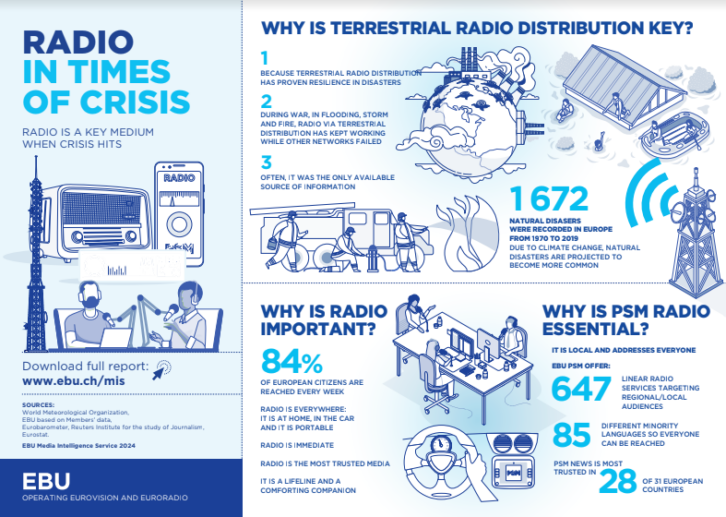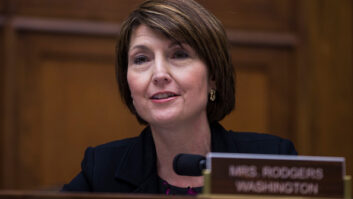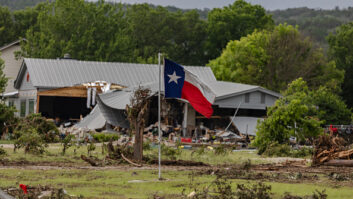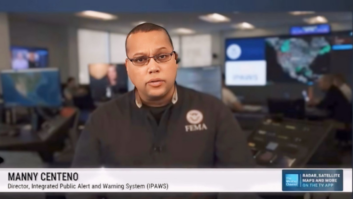Radio World’s “Guest Commentaries” section provides a platform for industry thought leaders and other readers to share their perspective on radio news, technological trends and more. If you’d like to contribute a commentary, or reply to an already published piece, send a submission to [email protected].
The author is senior media analyst at European Broadcasting Union’s Media Intelligence Service.
Amidst increasing global uncertainties, including conflicts and rising natural disasters due to climate change, the importance of resilient communication networks has never been more evident. It is crucial to adopt a well-fitted strategy that anticipates increased instability.
From 1970 to 2019, Europe faced a staggering 1,672 natural disasters (from weather, climate and water), a figure projected to increase due to the intensification of climate change. Floods, storms, fires and other calamities threaten lives and property and disrupt essential communication networks. In such critical moments, reliable communication stands as a bulwark against chaos and confusion, crucial in mitigating casualties and orchestrating emergency responses.
Radio terrestrial distribution emerges as a lifeline in times of crisis. In several cases, such as:
- Floods in Germany and Belgium in 2021
- Storm Ophelia in Ireland in October 2017
- Bushfire 2019-2020 season in Australia
- Earthquake in Türkiye in February 2023
- War in Ukraine since Russia’s full-scale invasion in 2022
Terrestrial radio distribution proved to be crisis-proof. FM and DAB+ distribution continued to work during and after the disasters. In the meantime, in some cases, affected areas faced blackouts, no access to the internet and no mobile network. Often, the only way to receive vital information, such as emergency alerts and evacuation instructions, was via the radio.
Investment in terrestrial infrastructure becomes imperative as it forms a cornerstone of societal resilience during emergencies. Strengthening terrestrial networks ensures communities remain connected and informed even in the most challenging circumstances.

Why is radio an essential medium in times of crisis?
When a crisis hits, messages must spread as widely and quickly as possible. Therefore, emergency procedures involve multiple delivery channels such as sirens, radio and the internet. Radio remains central in the strategy because it is immediate and uses resilient networks.
Also, radios are devices that have many assets. They are widely-available, affordable portable, and easy to use. FM/DAB radio needs to remain standard and prominent in the car. In many cases of emergency, using the car can be the quickest way to reach a safe area, and drivers need information. Battery-operated radios are also key survival tools in the event of a blackout or for people on the run. Societies should make sure that there is broad awareness of the importance of emergency kits, which include battery radios.
Radio is part of people’s daily lives. It reaches more than eight in ten European citizens every week. It is the most trusted medium, and a top-of-mind source of information, also when news matters most. Moreover, it offers more than news. It provides a connection to the world and companionship in long-lasting crises such as war, pandemics and heatwaves.
We need radio at each stage of a crisis.
Why is PSM radio essential?
EBU Public Service Media (PSM) radio offers 647 local services and uses 125 languages. This extensive network of regional services and coverage in multiple languages ensures that it reaches and addresses the needs of diverse communities, including those in localized disaster situations.
PSM radio emerges as a cornerstone during crises, with research showing that 90% of European countries surveyed viewed PSM news as the most trusted source for news.
PSM radio’s vital role in crises is evident from its high trust ratings and public perception during disaster events. After the 2019-2020 bushfire season in Australia, an evaluation study was conducted. Among Australian people, 54% used ABC Australia as their main source of information. Among people living in the affected areas, 59% acted on information from the ABC to ensure safety.
A similar study was conducted in France about the media perception during the COVID-19 lockdown. In this dark period of massive disinformation and mistrust, PSM radio and TV remained a lighthouse. Among French people, in the context of the pandemic, PSM radio and TV had the highest level of trust. Also, 84% of PSM radio users agreed PSM radio played their role in providing information on the COVID-19 crisis.
For all these reasons, societies need strong PSM radio.
The Media Intelligence Service (MIS) is the market research unit of the EBU. The team identifies issues that impact public service media and provides EBU Members with reliable data, trustworthy analysis and relevant arguments to build their case.







